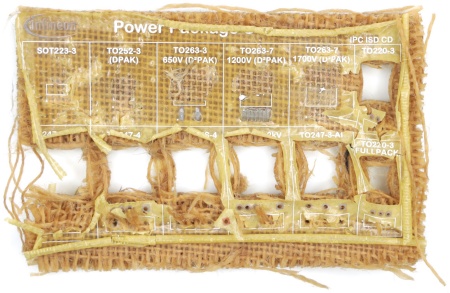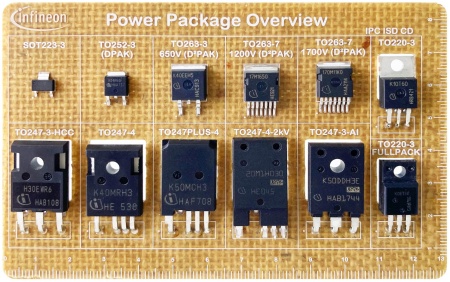
If our technological evolution has one shadow, it's environmental sustainability. Every year, gigatons of deprecated electronic materials are incorrectly disposed of, leading to lost opportunities to recover rare precious metals while simultaneously risking ecological damage. To curb the rising amount of electronic waste, semiconductor and PCB expert Infineon partnered with Jiva Materials to explore the company's biodegradable, water-soluble PCB design. Soluboard - the board that can be dissolved - is here.
Instead of the traditional glass-based fibers and chemicals used in common PCB materials, Soluboard tech uses natural fibers that are naturally biodegradable. These fibers are then enveloped in a non-toxic polymer (which is to say, a spray-on plastic solution) that completely dissolves in hot water, allowing the environment to start composting the fibers that compose the PCB's structure itself. Besides the direct environmental sustainability gains from not building up Babel towers of disposed electronics, this degradable PCB also allows for the appended electronics to be later removed and recycled without the risk of secondary damage.
"For the first time, a recyclable, biodegradable PCB material is being used in the design of electronics for consumer and industrial applications – a milestone towards a greener future," said Andreas Kopp, Head of Product Management Discretes at Infineon's Green Industrial Power Division. "We are also actively researching the reusability of discrete power devices at the end of their service life, which would be an additional significant step towards promoting a circular economy in the electronics industry."
Circular economy, in this case, refers to the dream of a virtuous recycling, well, cycle, where components and materials used for new electronics are sourced from already-existing materials. Besides the obvious monetary advantage of this approach, the secondary benefits of reducing dependence on newly extracted raw materials are reduced - something that might help the Western chip manufacturing industry from being held at the throat by Chinese-imposed rare earth export restrictions. A circular data economy is precisely what AI companies such as OpenAI are attempting to solve with their research on recursive training. It is something most other industries are trying to get at as well.


"Adopting a water-based recycling process could lead to higher yields in the recovery of valuable metals," said Jonathan Swanston, CEO and co-founder of Jiva Materials. "In addition, replacing FR-4 PCB materials with Soluboard would result in a 60 percent reduction in carbon emissions – more specifically, 10.5 kg of carbon and 620 g of plastic can be saved per square meter of PCB."
For now, Infineon is still testing the PCBs in non-critical deployments, such as in demo and evaluation boards - the rapid-fire yet materially costly iteration on prototyping. The company has already produced three PCB designs based on the material, which have resulted in more than 500 PCB boards being built on the technology, one of which is to be applied in refrigerator designs.
500 showcase PCBs built from only three base designs should give you an idea of the environmental benefits ingrained in the tech.
Infineon hopes to eventually scale the usage of Soluboard for its business lineup, representing another tick on its attempt to follow the European Commission's "Green Deal" program - which aims to achieve climate neutrality by 2050.







